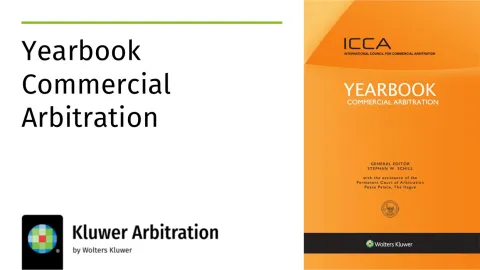EU Sanctions and Public Order: Foreign Policy Goals at Odds with Contractual Justice?
August 14, 2025
A foreign arbitral award that provides for a payment obligation that is contrary to EU sanctions violates public order pursuant to Article V(2)(b) of the New York Convention and thus cannot be enforced. This is the bottom line of two recent decisions by the Higher Regional Court (OLG) of Cologne of 24 May 2024 and the Higher Regional Court of Stuttgart of 13 May 2025. The courts, however, apply the principle differently – with the effect that the decisions, on the face of it, appear to be contradicting each other. The decisions illustrate the intricate interplay between sanctions and contract law in international arbitration, as well as how foreign policy goals can be at odds with contractual justice.
The post discusses the decisions of the Higher Regional Courts of Cologne (A.) and Stuttgart (B.) against the background of the “toolbox” of EU sanctions (C.). It concludes with a discussion of the obvious tensions between the overarching political aim of the sanctions and the commercial logic of specific transactions affected by them (D.) and whether the “neutral seat” actually is the fix (E.), as has been proposed more recently.
A. The Decision of the Higher Regional Court of Cologne
In this case, the Russian applicant requested the recognition of an SCC arbitral award that the applicant had obtained against a German respondent, a supplier of machinery. The machinery was defective, and the applicant had rescinded the supply agreement. The arbitral tribunal, in an award dated 4 May 2022, ordered the respondent to repay the purchase price. When applying for the recognition and enforcement of the award, the respondent defended that the beneficiary of the award was subject to sanctions pursuant to EU Ordinance 269/2014 (following an amendment on 13 March 2022, a few weeks before the award was rendered).
The Higher Regional Court nevertheless declared the award enforceable, however, with the proviso that granting exequatur requires proof that payments under the award would not violate applicable sanctions. The court argued that a declaratory judgment confirming that the award would be recognized and declaring it enforceable must be discerned from granting exequatur. A judgment holding that the award is enforceable can be granted with the proviso that the actual execution is subject to financial sanctions being complied with. As long as the respondent paid the funds into a blocked account, the court argued, the payment would not violate financial sanctions, as no funds would be availed to a sanctioned person. This permits a person subject to sanctions to obtain a decision recognizing a foreign arbitral award, without being in violation of sanctions, as the funds can only be paid out for the benefit of the applicant after the sanctions have been lifted.
The underlying ratio apparently is that sanctions shall not release a party from claims that are based on breach of contract. At the same time, a flow of funds to the sanctioned person must be avoided.
B. The Decision of the Higher Regional Court of Stuttgart
In the decision of the Higher Regional Court of Stuttgart, the Russian applicant also requested the recognition and enforcement of an arbitral award issued against a German respondent, however, by the Russian Chamber of Industry and Commerce. The award was based on a supply agreement for the supply of machinery that the parties had concluded in 2021 and that the respondent could not implement, due to EU sanctions targeting Russian industry because of the war against Ukraine. The applicant requested repayment of an advance payment, and the arbitral tribunal seated in Russia issued an award in the applicant’s favor. In the recognition proceedings, the respondent argued that the award had disregarded EU sanctions and, therefore, could not be enforced in Germany.
The Higher Regional Court denied enforcement in arguing that the supply was caught by the export restrictions imposed by EU Ordinance 833/2014 as amended and that, therefore, the respondent was released from the payment obligation according to the “no claims clause” in Article 11 (1). The provision provides that:
“No claims in connection with any contract or transaction the performance of which has been affected […] by the measures imposed under this Regulation […] shall be satisfied, if they are made by […] any [...] Russian person, entity or body.”
According to the more recent interpretation by the EU Commission, also endorsed by the German Ministry of Economy (BMWE) in no 51 of the current FAQs, this also prohibits the repayment of an advance payment, in the event a transaction is caught by sanctions (that normally will have been applied after the respective transaction was concluded).
Naturally, the arbitral tribunal seated in Russia did not give effect to the EU-Russia sanctions. This means that it was left to the court in the jurisdiction of enforcement to ensure that applicable sanctions are complied with.
C. EU Sanctions: The Toolbox
EU sanctions are all based on the same modular system, and a closer look helps to better understand the repercussions in international arbitration.
Export restrictions relating to specific sectors and goods. In the case decided by the Higher Regional Court of Stuttgart, the export restrictions targeted the Russian industry, the capabilities of which should be contained. This can have the effect that supply agreements can no longer be discharged.
Freezing of funds and assets. The funds and assets of a sanctioned natural or legal person are frozen, so that the person can no longer dispose of them.
Prohibition of availing funds or economic resources. This shall prevent any inflow of funds or of economic resources that can be converted into money. This also prohibits an indirect availing of funds, such as in the case decided by the Higher Regional Court of Cologne, where an affiliated entity was subject to sanctions. A sanctioned person may not indirectly benefit from a payment.
No claims clause. Finally, the no-claims clause shall protect the European enterprise that acts in compliance with sanctions. Noncompliance with contractual obligations due to sanctions may not subject the complying party to any damage or other claims.
Sanctions are an instrument of foreign policy and, in the EU, are administered primarily by the Council of Foreign Relations. The interplay with contractual agreements and general contract law rules can be delicate – as the two court decisions discussed above demonstrate.
D. Political Effectiveness vs Contractual Justice?
Both cases do show the increasing importance of sanctions in international arbitration – and the effects this can have on the level of recognition and enforcement. The sanctions imposed by the EU against Russia in reaction to the war against Ukraine are not applied by many countries in the Global South, not to speak of the Russian courts. Sanctions are no longer universal, as they were in the past, when respective restrictions typically were imposed and administered by the United Nations. Instead, today’s sanction regimes are fragmented. And it is probably fair to say that more countries do not apply EU sanctions than would give them effect. This means that many international arbitral tribunals with a seat outside the EU will not see themselves bound to apply EU sanctions. What in turn means that the application of the sanctions in the EU is transferred to the level of recognition and enforcement.
Furthermore, and maybe more interestingly, the cases show a certain tension between the political aim to give sanctions full effect (effect utile) – a principle the European Court of Justice featured prominently, e.g., more recently in the Bank Sepah decision – and what this entails in a concrete case. The application of sanctions can lead to a result that is not in line with contractual justice. Why shall a seller be entitled to retain an advance payment, only because later sanctions were imposed against the buyer (for reasons unrelated to the transaction)? The mechanical application of EU sanctions appears to have unwanted effects on the contractual level. The background is that, according to the ECJ, when applying sanctions, the overall political goals override legitimate interests of the parties involved. While the Higher Regional Court of Stuttgart faithfully follows that tradition, the Higher Regional Court of Cologne presents a more creative solution, preventing a payment for the benefit of a sanctioned party and at the same time giving effects to the contractual bargain; the approach however still needs to be tested in practice (in particular it is not entirely clear how the creditor can establish that a payment does not violate sanctions to the satisfaction of the execution court).
E. Is a Neutral Seat the Solution?
The aforementioned developments fuel the debate on “neutral” seats. Arbitration centers such as SIAC in Singapore and CRCICA in Egypt market themselves as being little impacted by sanctions and thus providing an accessible and impartial forum, “operating from a sanction-free jurisdiction and guided by internationally recognized rules and procedures,” in contrast to other jurisdictions where the courts would take a stricter approach towards monitoring the application of mandatory provisions in arbitration. Neutrality is, of course, a beautiful concept, and no interference through sanctions is also an important selling point in arbitration, considering how cumbersome sanctions can make any arbitral proceeding. At the same time, this only shifts sanction compliance to the jurisdiction of enforcement, where the courts may apply the sanctions even more rigorously, considering that the arbitral tribunal disregarded them in the arbitration proceedings. So, neutral seats do not help in cases where the award in the end shall be enforced against assets in the EU.
Neutrality in this case is not the quick fix. Sanctions in arbitration – the debate is not over.
You may also like










